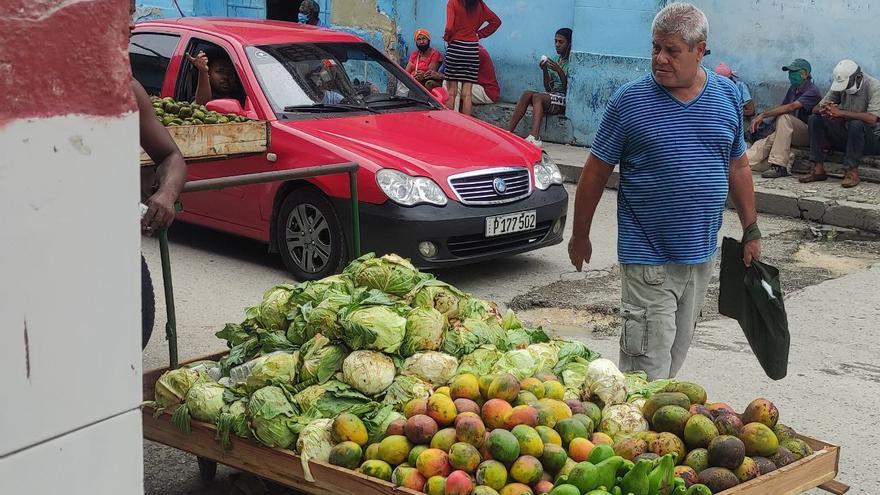
![]() 14ymedio, Havana, June 7, 2022 — Cuba’s economy is very ill-equipped to deal with a crisis like the one caused by the war in Ukraine, which began with Russia’s invasion nearly four months ago. This is one of the takeaways from a report published on Monday by the Economic Commission for Latin America and the Caribbean (ECLAC). Entitled “Repercussions in Latin American and the Caribbean of the war in Ukraine: how should the region face this new crisis?”, it deals with the island’s dependency on food imports.
14ymedio, Havana, June 7, 2022 — Cuba’s economy is very ill-equipped to deal with a crisis like the one caused by the war in Ukraine, which began with Russia’s invasion nearly four months ago. This is one of the takeaways from a report published on Monday by the Economic Commission for Latin America and the Caribbean (ECLAC). Entitled “Repercussions in Latin American and the Caribbean of the war in Ukraine: how should the region face this new crisis?”, it deals with the island’s dependency on food imports.
In a Twitter post Cuban economist Pedro Monreal points out that, at 29.7%, the country had the region’s third highest level of food imports in 2019, three times higher than the regional average, behind the Bahamas and Haiti and ahead of Venezuela. “[This] indicates a high vulnerability to rising prices and supply shortages, conditions which are occurring today,” he writes.
Monreal points out another negative indicator in the ECLAC report: renewable energy. “In 2020, Cuba was one of the countries in the region that lagged behind in the use of electricity generated from renewable resources,” he writes. He includes a graph showing that only Grenada and Guyana lag further behind.
The ECLAC report states that the effects of the war in Ukraine on Latin America, especially in terms of increased food and energy prices, have to be analyzed in the context of almost twenty years of “external shocks.” It adds that, despite differences in symptoms and intensity from one country to another, investment and production conditions in the region “have persistently deteriorated in an atmosphere of generally increasing uncertainty.”
The organization cites the 2008 financial crisis, the 2017 Chinese crisis and the 2020 global Covid-19 pandemic as external shocks which, it says, “have resulted in changes that have fed each off other, weakened globalization as an engine of growth and allowed geopolitics to prevail over efficiency.”
In any case, this means that in 2022 continent-wide poverty will increase 33.7% while extreme poverty will climb 14.9%. These represent increases of 1.6% and 1.1% respectively from 2021. In other words, 7.8 million Latin Americans will join the 86.4 million whose food security is already at risk.
Cubans, however, do not need reports to tell them about higher food prices and energy shortages. They have been suffering from them on a daily basis for a long time, long before the conflict in Europe began.
Tuesday saw the return of long lines at Havana’s gas stations and it was not unusual to hear complaints about high prices and the low quality of fruits and vegetables at the capital’s produce markets
“The onions are almost rotten and they’re selling them for 130 pesos a pound,” complained one city resident at the market between 17th and K streets in the Vedado district. “Where do they get the nerve? I don’t know if it’s a problem with the rains or what but it wasn’t like this last week.”
A young man holds out a large, over-ripe piece of fruit. “For some reason they charged me 140 pesos for this mango that was hidden behind the pallet. The price was much higher than what was shown on the chalkboard.”
But the hardest thing to find these days, whether it be in the capital or cities such as Santiago de Cuba or Sancti Spiritus, is meat. According to Monreal, Cuban imports of chicken from the United States fell approximately 30% in April.
Cubans commonly refer to their principal sources of protein as the three Ps: pollo, perro caliente and picadillo (chicken, hot dogs and ground meat). These have become increasingly hard to find. According to a new sales schedule adopted in Havana, a family will only be allowed to buy one of these products once a month.
To deal with the shortage, home cooks are devising any number of recipes using fillers and other ingredients to stretch what little meat is available. But such creativity presents its own problems. Flour, which traditionally has been used to make croquettes, hamburgers and meatloafs, is also in short supply. And cooking oil used to fry them is now a luxury item for many Cuban households.
____________
COLLABORATE WITH OUR WORK: The 14ymedio team is committed to practicing serious journalism that reflects Cuba’s reality in all its depth. Thank you for joining us on this long journey. We invite you to continue supporting us by becoming a member of 14ymedio now. Together we can continue transforming journalism in Cuba.
